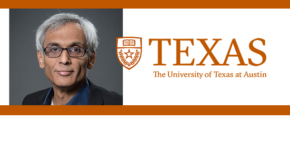 China is an economic powerhouse, but could that change.
China is an economic powerhouse, but could that change.
Kishore Gawande, Fred H. Moore Centennial professor of international management at the University of Texas at Austin, digs in to find out.
Kishore Gawande is a professor and chair of the Department of Business, Government & Society in The University of Texas at Austin’s McCombs School of Business. An award-winning professor, he teaches undergraduate and graduate courses on business, global political economy, and international business. Gawande’s research examines the effects of socioeconomic and political events on economies. He has examined economic relationships in emerging and developed economies on issues such as state capacity, institutions, protests, the effects of lobbying, and relationships between anti-poverty programs and violence reduction. Gawande has also studied global supply chains, trade policy, and economic crises, and some of his research has been funded by the World Bank and the National Science Foundation.
Gawande earned his Ph.D. in economics from UCLA. He holds the Fred H. Moore Centennial Professorship of International Management.
Property Rights Retreat is Dragging Down China’s Economy
China’s economy is in the news these days, and the news isn’t positive. There’s a real estate bust and a slowdown in growth. What has brought this giant to its knees?
Our research links it to a fundamental economic concept: property rights. By 2000, China’s growth had reached its limits within a system that allowed no private ownership of land and assets. Around 2007, that changed. A constitutional amendment enshrined a Property Rights Law, treating private and public ownership equally.
Our research looked at more than 14 million Chinese firms. We found that, in the five years following the law, there was an enormous boom in private enterprise. New firms came into being at a dizzying pace, an extra 39,000 a year.
Many of these start-ups became exporters within three years and evolved into major companies. The 2008 global crisis did not hurt China much, because domestic private industry more than made up for the drop in foreign demand.
How did we get to today’s bust, barely fifteen years after this boom period?
What’s happened is that Xi Jinping’s regime has rolled back property rights. It started with the powerful tech sector. China suspended the $37 billion IPO of its largest company, Ant Group, after founder Jack Ma criticized regulators.
The result is the rolling back of the prosperity that followed the Property Law. China’s largest developer, Evergrande, is being liquidated. Foreign investment is drying up. Supply chains in tech are leaving China, just as the next industrial revolution is occurring in AI.
Hopefully, Chinese rulers after Xi will see the folly and reinstate property rights. But they will have to deal with the inequality between public and private. The next regime will need to share power with the private sector once again.

